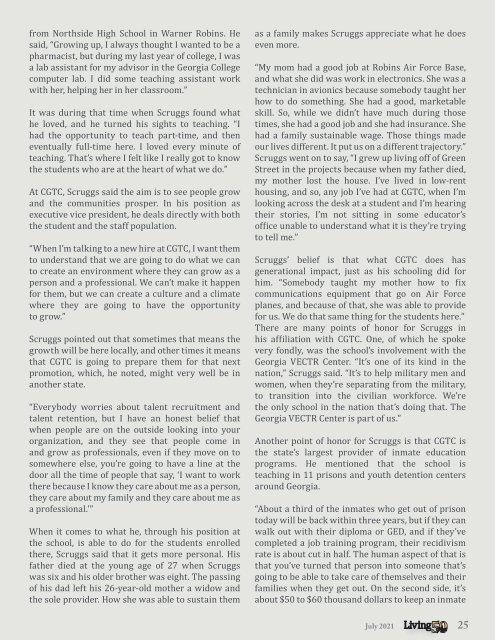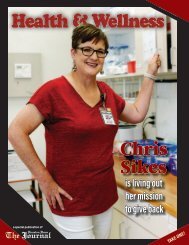Create successful ePaper yourself
Turn your PDF publications into a flip-book with our unique Google optimized e-Paper software.
from Northside High School in Warner Robins. He<br />
said, “Growing up, I always thought I wanted to be a<br />
pharmacist, but during my last year of college, I was<br />
a lab assistant for my advisor in the Georgia College<br />
computer lab. I did some teaching assistant work<br />
with her, helping her in her classroom.”<br />
It was during that time when Scruggs found what<br />
he loved, and he turned his sights to teaching. “I<br />
had the opportunity to teach part-time, and then<br />
eventually full-time here. I loved every minute of<br />
teaching. That’s where I felt like I really got to know<br />
the students who are at the heart of what we do.”<br />
At CGTC, Scruggs said the aim is to see people grow<br />
and the communities prosper. In his position as<br />
executive vice president, he deals directly with both<br />
the student and the staff population.<br />
“When I’m talking to a new hire at CGTC, I want them<br />
to understand that we are going to do what we can<br />
to create an environment where they can grow as a<br />
person and a professional. We can’t make it happen<br />
for them, but we can create a culture and a climate<br />
where they are going to have the opportunity<br />
to grow.”<br />
Scruggs pointed out that sometimes that means the<br />
growth will be here locally, and other times it means<br />
that CGTC is going to prepare them for that next<br />
promotion, which, he noted, might very well be in<br />
another state.<br />
“Everybody worries about talent recruitment and<br />
talent retention, but I have an honest belief that<br />
when people are on the outside looking into your<br />
organization, and they see that people come in<br />
and grow as professionals, even if they move on to<br />
somewhere else, you’re going to have a line at the<br />
door all the time of people that say, ‘I want to work<br />
there because I know they care about me as a person,<br />
they care about my family and they care about me as<br />
a professional.’”<br />
When it comes to what he, through his position at<br />
the school, is able to do for the students enrolled<br />
there, Scruggs said that it gets more personal. His<br />
father died at the young age of 27 when Scruggs<br />
was six and his older brother was eight. The passing<br />
of his dad left his 26-year-old mother a widow and<br />
the sole provider. How she was able to sustain them<br />
as a family makes Scruggs appreciate what he does<br />
even more.<br />
“My mom had a good job at Robins Air Force Base,<br />
and what she did was work in electronics. She was a<br />
technician in avionics because somebody taught her<br />
how to do something. She had a good, marketable<br />
skill. So, while we didn’t have much during those<br />
times, she had a good job and she had insurance. She<br />
had a family sustainable wage. Those things made<br />
our lives different. It put us on a different trajectory.”<br />
Scruggs went on to say, “I grew up living off of Green<br />
Street in the projects because when my father died,<br />
my mother lost the house. I’ve lived in low-rent<br />
housing, and so, any job I’ve had at CGTC, when I’m<br />
looking across the desk at a student and I’m hearing<br />
their stories, I’m not sitting in some educator’s<br />
office unable to understand what it is they’re trying<br />
to tell me.”<br />
Scruggs’ belief is that what CGTC does has<br />
generational impact, just as his schooling did for<br />
him. “Somebody taught my mother how to fix<br />
communications equipment that go on Air Force<br />
planes, and because of that, she was able to provide<br />
for us. We do that same thing for the students here.”<br />
There are many points of honor for Scruggs in<br />
his affiliation with CGTC. One, of which he spoke<br />
very fondly, was the school’s involvement with the<br />
Georgia VECTR Center. “It’s one of its kind in the<br />
nation,” Scruggs said. “It’s to help military men and<br />
women, when they’re separating from the military,<br />
to transition into the civilian workforce. We’re<br />
the only school in the nation that’s doing that. The<br />
Georgia VECTR Center is part of us.”<br />
Another point of honor for Scruggs is that CGTC is<br />
the state’s largest provider of inmate education<br />
programs. He mentioned that the school is<br />
teaching in 11 prisons and youth detention centers<br />
around Georgia.<br />
“About a third of the inmates who get out of prison<br />
today will be back within three years, but if they can<br />
walk out with their diploma or GED, and if they’ve<br />
completed a job training program, their recidivism<br />
rate is about cut in half. The human aspect of that is<br />
that you’ve turned that person into someone that’s<br />
going to be able to take care of themselves and their<br />
families when they get out. On the second side, it’s<br />
about $<strong>50</strong> to $60 thousand dollars to keep an inmate<br />
July <strong>2021</strong><br />
25

















